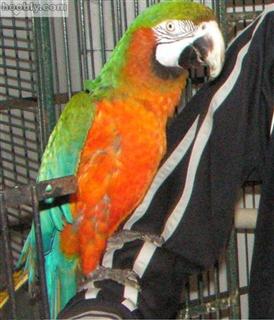Macaw - Harlequin
Scientific Name: Ara ararauna x chloroptera
Mon, 14th July, 2025 - 7:59 pm GMT
Sponsor Ads:

Alternative Name
Scientific Name: Ara ararauna x chloropteraBasic Info
A cross between Green Winged Macaws and Blue and Gold Macaws, the Harlequin Macaw is a striking and sizeable bird! Harlequin Macaws grow to about 34 inches in length and are very brightly colored. Usually, Harlequins are sired by Green Winged Macaws, since female Green Winged Macaws are often more difficult to find than female Blue and Gold Macaws, the typical mother of the cross. Generally, Harlequin Macaws inherit the father Green Wing's physical build and the mother's coloration, making it look identical to another hybrid, the Catalina Macaw. Usually, the chest feathers of Harlequin Macaws are reddish-orange and are edged with a brighter yellow-orange color.
Health
Harlequin Macaws do not occur naturally in the wild, and when crossed, their offspring's physical and mental dispositions cannot be predicted. They are highly energetic and need plenty of your time to socialize them properly in addition to plenty of space for them to exercise in!Habitat
N/ABehavior
The Harlequin Macaw is a very large, beautiful hybrid Macaw whose temperament is remarkably sweet and playful! Like all Macaws, Harlequin Macaws need lots of space in which to play and lots of attention from their families! These birds are inquisitive by nature, and explore the world by "feeling" it with their mouths! This means they will nibble gently on you, on their cages, their toys, and all sorts of things! Macaws love to chew, and Harlequin Macaws because of their large size will need plenty of wood to amuse themselves with in addition to a sturdy cage. Eager to please, the Harlequin Macaw forms a strong bond with its handler and can develop a vocabulary of human words! These Macaws are extremely intelligent and quite energetic and affectionate!Origin
N/AHistory
Many breeders are against the ownership and development of hybrid Macaws, since pure bloodlines are important. Most countries have laws about the import of wild birds. This means that captive birds are the only domestic genetic specimens of many species of Macaw. As hybrids are often very hard to tell apart physically from purebred Macaws, they could easily contaminate bloodlines by producing offspring that are not one species or the other! Also, with many types of wild Macaws becoming endangered or extinct, many people feel that domestic Macaws may someday become the only examples of their breeds remaining in existence! If they were to become crossed with hybrids, they would no longer be true examples of their breed.Common Foods
Harlequin Macaws love nuts and seeds, and their diet should include lots of fresh fruit and greenfood. Commercial parrot mixes are a good standard but will need to be supplemented with the fresh food.Sponsor Ads:
Why do they always start off the evening news with "Good evening" when all they do is tell you why it isn't? -- Unknown
Macaw - Harlequin
Coded by: BGID® | ALL RIGHTS RESERVED Copyright © 2000-2025
Disclaimer | Privacy | Report Errors / Contact | Credits








 Why haven't we as a collective earth met with aliens yet?
Why haven't we as a collective earth met with aliens yet?  World EcoSystem - Biodiversity Changes - Who is on board and who isn
World EcoSystem - Biodiversity Changes - Who is on board and who isn  Homosexual behavior stems from the mind or genetics?
Homosexual behavior stems from the mind or genetics?  The Best Text Adventure You Will Ever Play! The official site:
The Best Text Adventure You Will Ever Play! The official site:  Mouthwash - Mouthrinse - Mouth Sores - Healing Infections - Gingivitis
Mouthwash - Mouthrinse - Mouth Sores - Healing Infections - Gingivitis  Treatment for Depression
Treatment for Depression  Ultra radical and violent Islamist group that even rivals Al Qaeda
Ultra radical and violent Islamist group that even rivals Al Qaeda  An idea to have teachers who want to carry guns to school undergo some level of police training will be left up to local school districts and police departments.
An idea to have teachers who want to carry guns to school undergo some level of police training will be left up to local school districts and police departments.